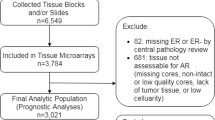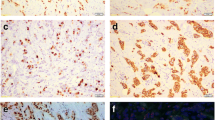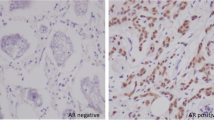Abstract
Purpose
Androgen Receptor (AR) positivity is often displayed in breast cancer and especially in Male Breast Cancer (MBC), where it appears to be a heterogeneous feature, with its expression ranging between 38 and 81% of cases. Given the fact that circulating androgens represent the most important sex hormones in males and that breast carcinogenesis is characteristically subjected to hormonal mechanisms, our purpose was to investigate the clinicopathological significance of AR in MBC assessing if its expression could be associated with parameters of tumor aggressiveness.
Methods
Clinical and pathological data were retrospectively reviewed for male patients with a diagnosis of invasive breast cancer. AR status was detected by immunohistochemistry on formalin-fixed, paraffin-embedded tumoral tissue sections. Correlations between AR expression and histopathological features were assessed using univariate and multiple comparisons where appropriate, assuming P values < 0.05 as statistically significant.
Results
The study included 44 consecutive male patients. AR expression ranged between 10 and 98% and the majority of cases presented a moderate to high expression of this receptor. Adopting a 20% PgR cut-off, statistical analyses highlighted a different behavior of AR: in ER+/PgRhigh group, it positively correlated with the other steroid receptors pointing out the importance of hormonal cross-talk: in ER+/PgRlow group, AR status inversely correlated with histological grade and lymph node status.
Conclusion
Hormonal factors reveal to play a crucial role in MBC carcinogenesis and progression. Intriguingly, in ER+/PgRlow tumors AR expression significantly correlates with lymph node status, hinting at a favorable biological role of AR in this tumor subgroup.






Similar content being viewed by others
References
Siegel RL, Miller KD, Jemal A (2019) Cancer statistics, 2019. CA Cancer J Clin 69:7–34. https://doi.org/10.3322/caac.21551
Scarpitta R, Zanna I, Aretini P et al (2019) Germline investigation in male breast cancer of DNA repair genes by next-generation sequencing. Breast Cancer Res Treat 178:557–564. https://doi.org/10.1007/s10549-019-05429-z
Piscuoglio S, Ng CKY, Murray MP et al (2016) The Genomic Landscape of Male Breast Cancers. Clin Cancer Res 22:4045–4056. https://doi.org/10.1158/1078-0432.CCR-15-2840
Fentiman IS (2018) The biology of male breast cancer. The Breast 38:132–135. https://doi.org/10.1016/j.breast.2018.01.001
Giordano SH (2018) Breast Cancer in Men. N Engl J Med 378:2311–2320. https://doi.org/10.1056/NEJMra1707939
Howlader N, Noone A, Krapcho M, et al (2019) SEER Cancer Statistics Review, 1975–2016, National Cancer Institute. Bethesda, MD, https://seer.cancer.gov/csr/1975_2016/
Ghilli M, Mariniello MD, Scatena C et al (2018) Male secretory breast cancer: case in a 6-year-old boy with a peculiar gene duplication and review of the literature. Breast Cancer Res Treat 170:445–454. https://doi.org/10.1007/s10549-018-4772-4
Gucalp A, Traina TA, Eisner JR et al (2019) Male breast cancer: a disease distinct from female breast cancer. Breast Cancer Res Treat 173:37–48. https://doi.org/10.1007/s10549-018-4921-9
Vermeulen MA, Slaets L, Cardoso F et al (2017) Pathological characterisation of male breast cancer: Results of the EORTC 10085/TBCRC/BIG/NABCG International Male Breast Cancer Program. Eur J Cancer 82:219–227. https://doi.org/10.1016/j.ejca.2017.01.034
Mosly D, Turnbull A, Sims A et al (2018) Predictive markers of endocrine response in breast cancer. World J Exp Med 8:1–7. https://doi.org/10.5493/wjem.v8.i1.1
Ethier JL, Ocaña A, Rodríguez Lescure A et al (2018) Outcomes of single versus double hormone receptor–positive breast cancer. A GEICAM/9906 sub-study. Eur J Cancer 94:199–205. https://doi.org/10.1016/j.ejca.2018.02.018
Early Breast Cancer Trialists’ Collaborative Group (EBCTCG) (2011) Relevance of breast cancer hormone receptors and other factors to the efficacy of adjuvant tamoxifen: patient-level meta-analysis of randomised trials. The Lancet 378:771–784. https://doi.org/10.1016/S0140-6736(11)60993-8
Ono M, Tsuda H, Yoshida M et al (2017) Prognostic Significance of Progesterone Receptor Expression in Estrogen-Receptor Positive, HER2-Negative, Node-Negative Invasive Breast Cancer With a Low Ki-67 Labeling Index. Clin Breast Cancer 17:41–47. https://doi.org/10.1016/j.clbc.2016.06.012
Lim E, Palmieri C, Tilley WD (2016) Renewed interest in the progesterone receptor in breast cancer. Br J Cancer 115:909–911. https://doi.org/10.1038/bjc.2016.303
Mohammed H, Russell IA, Stark R et al (2015) Progesterone receptor modulates ERα action in breast cancer. Nature 523:313–317. https://doi.org/10.1038/nature14583
Narayanan R, Dalton J (2016) Androgen Receptor: A Complex Therapeutic Target for Breast Cancer. Cancers 8:108. https://doi.org/10.3390/cancers8120108
Basile D, Cinausero M, Iacono D et al (2017) Androgen receptor in estrogen receptor positive breast cancer: Beyond expression. Cancer Treat Rev 61:15–22. https://doi.org/10.1016/j.ctrv.2017.09.006
Rahim B, O’Regan R (2017) AR Signaling in Breast Cancer Cancers 9:21. https://doi.org/10.3390/cancers9030021
Rangel N, Rondon-Lagos M, Annaratone L et al (2018) The role of the AR/ER ratio in ER-positive breast cancer patients. Endocr Relat Cancer 25:163–172. https://doi.org/10.1530/ERC-17-0417
Gamat M, McNeel DG (2017) Androgen deprivation and immunotherapy for the treatment of prostate cancer. Endocr Relat Cancer 24:T297–T310. https://doi.org/10.1530/ERC-17-0145
Sas-Korczynska B, Adamczyk A, Niemiec J et al (2015) Androgen receptor in male breast cancer. Pol J Pathol 4:347–352. https://doi.org/10.5114/pjp.2015.57065
Wenhui Z, Shuo L, Dabei T et al (2014) Androgen receptor expression in male breast cancer predicts inferior outcome and poor response to tamoxifen treatment. Eur J Endocrinol 171:527–533. https://doi.org/10.1530/EJE-14-0278
Goldhirsch A, Winer EP, Coates AS et al (2013) Personalizing the treatment of women with early breast cancer: highlights of the St Gallen International Expert Consensus on the Primary Therapy of Early Breast Cancer 2013. Ann Oncol 24:2206–2223. https://doi.org/10.1093/annonc/mdt303
Goldhirsch A, Wood WC, Coates AS et al (2011) Strategies for subtypes—dealing with the diversity of breast cancer: highlights of the St Gallen International Expert Consensus on the Primary Therapy of Early Breast Cancer 2011. Ann Oncol 22:1736–1747. https://doi.org/10.1093/annonc/mdr304
Kurozumi S, Matsumoto H, Hayashi Y et al (2017) Power of PgR expression as a prognostic factor for ER-positive/HER2-negative breast cancer patients at intermediate risk classified by the Ki67 labeling index. BMC Cancer 17:354. https://doi.org/10.1186/s12885-017-3331-4
Prat A, Cheang MCU, Martín M et al (2013) Prognostic Significance of Progesterone Receptor-Positive Tumor Cells Within Immunohistochemically Defined Luminal A Breast Cancer. J Clin Oncol 31:203–209. https://doi.org/10.1200/JCO.2012.43.4134
Abreu MH, Afonso N, Abreu PH et al (2016) Male breast cancer: Looking for better prognostic subgroups. The Breast 26:18–24. https://doi.org/10.1016/j.breast.2015.12.001
Kensler KH, Regan MM, Heng YJ et al (2019) Prognostic and predictive value of androgen receptor expression in postmenopausal women with estrogen receptor-positive breast cancer: results from the Breast International Group Trial 1–98. Breast Cancer Res 21:30. https://doi.org/10.1186/s13058-019-1118-z
Giovannelli P, Di Donato M, Galasso G et al (2018) The Androgen Receptor in Breast Cancer. Front Endocrinol 9:492. https://doi.org/10.3389/fendo.2018.00492
Bozovic-Spasojevic I, Zardavas D, Brohée S et al (2017) The Prognostic Role of Androgen Receptor in Patients with Early-Stage Breast Cancer: A Meta-analysis of Clinical and Gene Expression Data. Clin Cancer Res 23:2702–2712. https://doi.org/10.1158/1078-0432.CCR-16-0979
Aleskandarany MA, Abduljabbar R, Ashankyty I et al (2016) Prognostic significance of androgen receptor expression in invasive breast cancer: transcriptomic and protein expression analysis. Breast Cancer Res Treat 159:215–227. https://doi.org/10.1007/s10549-016-3934-5
Iacopetta D, Rechoum Y, Fuqua SAW (2012) The role of androgen receptor in breast cancer. Drug Discov Today Dis Mech 9:e19–e27. https://doi.org/10.1016/j.ddmec.2012.11.003
Castellano I, Allia E, Accortanzo V et al (2010) Androgen receptor expression is a significant prognostic factor in estrogen receptor positive breast cancers. Breast Cancer Res Treat 124:607–617. https://doi.org/10.1007/s10549-010-0761-y
Cochrane DR, Bernales S, Jacobsen BM et al (2014) Role of the androgen receptor in breast cancer and preclinical analysis of enzalutamide. Breast Cancer Res 16:R7. https://doi.org/10.1186/bcr3599
Witzel I, Graeser M, Karn T et al (2013) Androgen receptor expression is a predictive marker in chemotherapy-treated patients with endocrine receptor-positive primary breast cancers. J Cancer Res Clin Oncol 139:809–816. https://doi.org/10.1007/s00432-013-1382-8
Bae SY, Kim S, Lee JH et al (2015) Poor prognosis of single hormone receptor- positive breast cancer: similar outcome as triple-negative breast cancer. BMC Cancer 15:138. https://doi.org/10.1186/s12885-015-1121-4
Diep CH, Ahrendt H, Lange CA (2016) Progesterone induces progesterone receptor gene (PGR) expression via rapid activation of protein kinase pathways required for cooperative estrogen receptor alpha (ER) and progesterone receptor (PR) genomic action at ER/PR target genes. Steroids 114:48–58. https://doi.org/10.1016/j.steroids.2016.09.004
Viale G, Regan MM, Maiorano E et al (2007) Prognostic and Predictive Value of Centrally Reviewed Expression of Estrogen and Progesterone Receptors in a Randomized Trial Comparing Letrozole and Tamoxifen Adjuvant Therapy for Postmenopausal Early Breast Cancer: BIG 1–98. J Clin Oncol 25:3846–3852. https://doi.org/10.1200/JCO.2007.11.9453
Need EF, Selth LA, Harris TJ et al (2012) Research Resource: Interplay between the Genomic and Transcriptional Networks of Androgen Receptor and Estrogen Receptor α in Luminal Breast Cancer Cells. Mol Endocrinol 26:1941–1952. https://doi.org/10.1210/me.2011-1314
Liu X-Y, Ma D, Xu X-E et al (2018) Genomic Landscape and Endocrine-Resistant Subgroup in Estrogen Receptor-Positive, Progesterone Receptor-Negative, and HER2-Negative Breast Cancer. Theranostics 8:6386–6399. https://doi.org/10.7150/thno.29164
Hanley K, Wang J, Bourne P et al (2008) Lack of expression of androgen receptor may play a critical role in transformation from in situ to invasive basal subtype of high-grade ductal carcinoma of the breast. Hum Pathol 39:386–392. https://doi.org/10.1016/j.humpath.2007.07.007
Bleach R, McIlroy M (2018) The Divergent Function of Androgen Receptor in Breast Cancer; Analysis of Steroid Mediators and Tumor Intracrinology. Front Endocrinol 9:594. https://doi.org/10.3389/fendo.2018.00594
Davies AH, Zoubeidi A (2016) The Androgen Receptor Bridges Stem Cell-Associated Signaling Nodes in Prostate Stem Cells. Stem Cells Int 2016:1–10. https://doi.org/10.1155/2016/4829602
Qu Q, Mao Y, Fei X, Shen K (2013) The Impact of Androgen Receptor Expression on Breast Cancer Survival: A Retrospective Study and Meta-Analysis. PLoS ONE 8:e82650. https://doi.org/10.1371/journal.pone.0082650
Vera-Badillo FE, Templeton AJ, de Gouveia P et al (2014) Androgen Receptor Expression and Outcomes in Early Breast Cancer A Systematic Review and Meta-Analysis. J Natl Cancer Inst 106:319–319. https://doi.org/10.1093/jnci/djt319
Acknowledgements
The authors would like to acknowledge all the patients that were involved in this study.
Funding
This study was supported by research funding Susan G. Komen Italia onlus 2017.
Author information
Authors and Affiliations
Corresponding author
Ethics declarations
Conflict of interest
All authors declare that there is no conflict of interest.
Ethical approval
All the procedures performed in studies involving human participants were in accordance with the ethical standards of the institutional and/or national research committee and with the 1964 Helsinki declaration and its later amendments or comparable ethical standards.
Informed consent
Informed consent was obtained from all individual participants included in the study.
Additional information
Publisher's Note
Springer Nature remains neutral with regard to jurisdictional claims in published maps and institutional affiliations.
Electronic supplementary material
Below is the link to the electronic supplementary material.
Rights and permissions
About this article
Cite this article
Scatena, C., Scarpitta, R., Innocenti, L. et al. Androgen receptor expression inversely correlates with histological grade and N stage in ER+/PgRlow male breast cancer. Breast Cancer Res Treat 182, 55–65 (2020). https://doi.org/10.1007/s10549-020-05682-7
Received:
Accepted:
Published:
Issue Date:
DOI: https://doi.org/10.1007/s10549-020-05682-7




